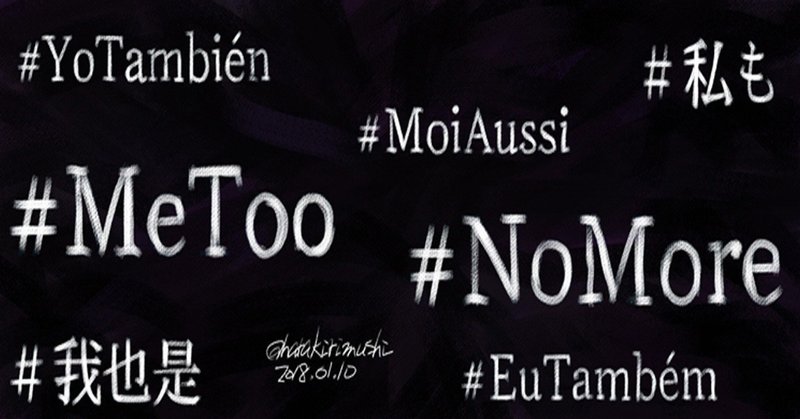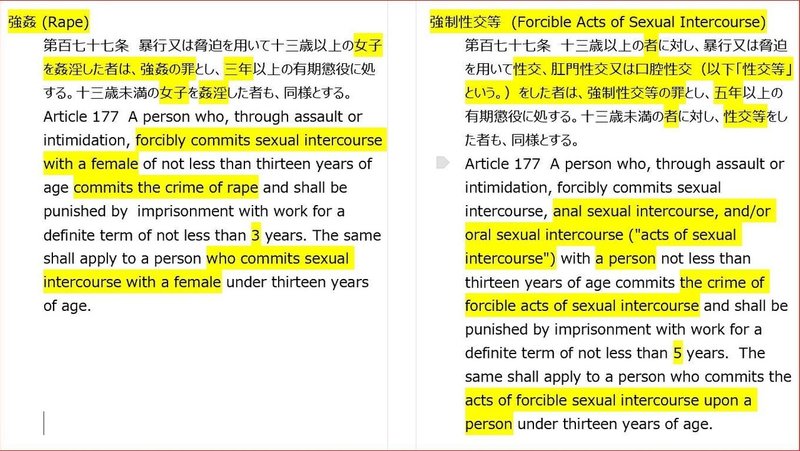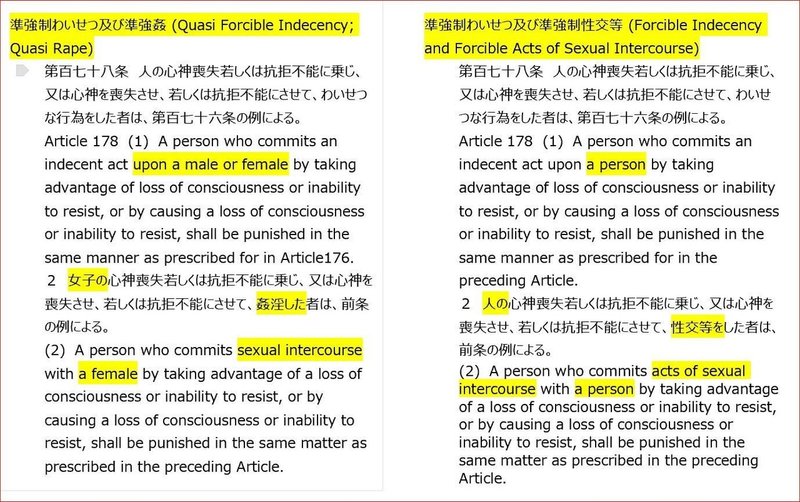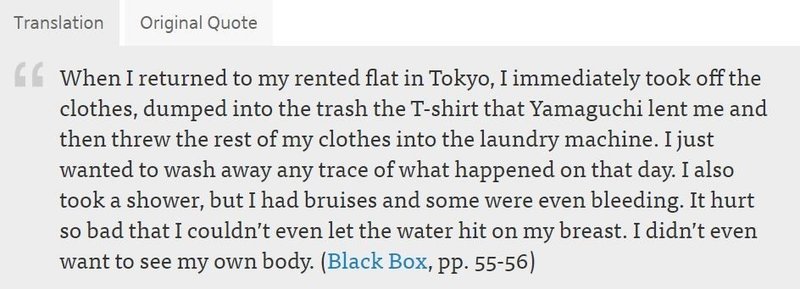
What I really wanted to tell in the @GlobalVoices 'introductory' #MeToo story on Japan (2/4)
Last updated: 2019/2/10 | Original Japanese
#MeToo in #Japan (Part 2) - Lack of victim-focused system of legal enforcement
While it was difficult for Hachu to prove that her manager at Dentsu has made sexual advances to her by calling her up to his place, Shiori and Meili had an even more difficult challenge trying to prove they were sexually assaulted. Shiori’s case was dropped after being investigated by prosecutors, while police never even referred Meili’s case to prosecutors in the first place.
Proving sexual assault is difficult in Japan
Shiori and Meili’s difficulty persuading prosecutors an assault had taken place is the result of existing Japanese law. According to Japan’s “sex crime law” revised in June 2017, victims are still required to substantiate that sexual assault actually happened by providing evidence of what the law calls “assault or intimidation.”
Reference: Old & New laws on rape
Article 177. Crime of Rape (Old vs. New)

Article 178. Crime of Quasi Rape (Old vs. New)

In an interview with Global Voices (GV), Meili said the police dismissed the case immediately without even interrogating the alleged perpetrator because she could not prove to them that a sexual assault did, in fact, take place.
Meili states that there were several reasons why she could not prove what happened and her experience resembles the ordeal Shiori reports going through with the police when she made her case against her alleged assailant. In her October 2017 book about her sexual assault, "Black Box", Shiori reported that police forced her to reenact her assault using something resembling a crash-test dummy as male officers looked on and took photographs.
I had to repeat my statement to numerous police officers. One investigator told me that if I didn’t cry, or act like a “victim,” they couldn’t tell if I was telling the truth. At one point, I had to reenact what happened with a life-size dummy at the Takanawa police station while officers took photographs. It was traumatizing and humiliating. A former colleague once referred to this procedure as “second rape” because it forces the victim to relive their ordeal.
In Meili's case, whatever happened between two adults "happen[ed] in a black box," an expression preferred by the Japanese police, according to the Swedish daily Dagens Nyheter. It meant that whatever happened in a 'black box' can only be proven with a testimony of either the victim or the perpetrator. However, Meili was fortunate enough that she had something extra to provide; the surveillance video of the hotel where she said was "taken" in.
The Japanese police use the phrase “it all happens in a black box” where there is no transparency and it’s your words against theirs. That was also the reason that Shiori decided to name her book the way it is.
Like Shiori, Meili says she was able to produce what should have been a proof of her assault. However, the police told her that being taken to a hotel with his arms wrapped around her shoulder does not constitute sexual assault and therefore could not be substantiated:

Meili's video footage appeared to be inconclusive to the investigators' eyes, and without any other substantial evidence, Meili's claim was rejected. There was no investigation, and no arrest.
This is in stark contrast to Shiori's situation where the video evidence was considered to be one of vital evidences that lead to issuing the arrest warrant - which was mysteriously not executed by senior orders - according to The New York Times.
“Ms. Ito also appears incapacitated in hotel security camera footage obtained by the police. In pictures from the footage seen by The New York Times, Mr. Yamaguchi is propping her up as they move through the lobby around 11:20 p.m.”
"I just wanted to wash away any trace of what happened on that day."
Part of the reason that a ‘substantial’ evidence to prove either Shiori or Meili's attack is hard to find is because material evidence could not be physically obtained. According to wezzy magazine, which reported on Meili's case:

According to both Meili and Shiori, this is practically impossible because the first thing they want to do was get clean, as Shiori wrote in Black Box.

In Shiori's case she was fortunate that her assailant's DNA was detected from her bra. This proved to be a vital evidence to prompt the police to refer the case to the prosecution. Meili, however, was not so fortunate.
In an interview with GV, Meili said following her assault she also did not immediately seek treatment within 24 hours. Instead, Meili visited a maternity clinic nine days later, after she visited the police to file her complaint, and it was their recommendation to collect evidence at the clinic.
When asked how the police treated her, Meili says:

Meili also said:

In contrast, Shiori states in her book Black Box that she tried to get help from what she believed was Tokyo's only functioning sexual assault support center but because they required a short interview before providing any information, Shiori declined to visit them.

While victims of sexual assault are told to get a DNA test as soon as possible after the attack, such "rape kits" are often inaccessible. Compounding the problem, the social and medical safety nets supporting the victims in Japan are still weak. But the safety net has its say too.
noteをご覧くださりありがとうございます。基本的に「戦う」ためのnoteですが、私にとって何よりも大切な「戦い」は私たち夫婦のガンとの戦いです。皆さまのサポートが私たちの支えとなります。よろしくお願いいたします。
